For many actors, finding success in their chosen field is about mastering an array of talents, each one requiring a different approach and method. Two of the most prominent and contrasting arenas are stage and screen acting. These two voracious yet wondrous forms of the craft demand a careful act of balance, a tightrope walk of sorts that requires a strong sense of self, a deep respect for the craft, and an unwavering willingness to learn and adapt. This article is about understanding this delicate dance between screen and stage acting and the challenging yet rewarding path to maintain a balance between the two.
On the surface, acting on the silver screen and dramatic performance on stage may seem similar, as both require one to step into character, remember lines, and captivate an audience. However, they are distinctly different mediums and call for varying techniques and skills.
The thrill of producing magic on stage comes with an adrenaline rush that is unmatched. Stage acting is an immersive experience that engulfs both actor and audience in the same energy simultaneously. With no room for error, stage acting demands precision, delivery, and the ability to adjust on the fly. Each performance in front of a live audience is different and each night an actor must be prepared to respond to these changes whilst ensuring the integrity and consistency of the character. Actors must project their voices, embody their characters fully, and become masters of improvisation.
In contrast, screen acting is an intimate interplay of subtle expressions and calibrated emotions. It offers close-ups, relays microexpressions, and explores the power of silences. The challenge lies in the ability to perform under the intense scrutiny of the camera, and to recreate the same scene multiple times without losing the essence of the character or the emotional intensity of the scene. An exceptional screen actor possesses the capability to cultivate an intimate bond with their audience, to make them feel as if they’re the only ones privy to the private moments happening on screen.
Walking the line between these two worlds is not just a shift in technique, but a mental and emotional adjustment as well. The key to balancing stage and screen acting lies in understanding the core differences and similarities and being able to transition from one to the other while maintaining the emotional truth and authenticity of each performance.
Actors who successfully juggle stage and screen performances must be versatile and flexible, constantly expanding their repertoire. They cultivate their craft across both mediums by studying a wide range of acting techniques, working with different directors, and relentlessly immersing themselves in diverse roles. Comprehending and embodying the artistry of both forms of acting allow them to delve into the intricacies of human emotion and behaviour more deeply and portray their characters with heightened realism and sensitivity.
Balancing stage and screen acting also addresses the issue of professional longevity. By continuously honing their skills and refining their adaptability, actors increase their employability, stay relevant, and evolve with the times. The world of acting is dynamic and constantly changing, thus, variability in professional engagements can ensure a lasting and fulfilling career.
To balance this artistic tightrope requires a highly honed acumen, passion and unwavering tenacity. Actors like Meryl Streep, Ian McKellen, and Judi Dench, who have excelled in both mediums, perfectly exemplify the balancing act of stage and screen acting. They have shown that the ability to transcend the boundaries of stage and screen is not just a mark of artistic excellence, but also a testament of professional adaptability and enduring talent.
Whether one is a budding actor hoping to break barriers, or an established artist looking to diversify – the juggling act between stage and screen acting is a challenging one, but well worth the effort. Embrace the differences, leverage them for learning, and harness the power of both worlds. It opens up a versatile, dynamic and profound realm of possibilities, allowing you to leave a lasting mark on the hearts and minds of your audience.




